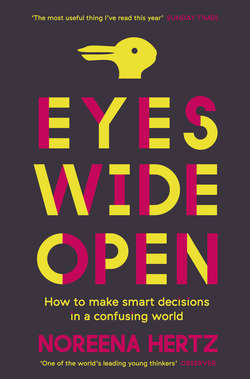Читать книгу Eyes Wide Open: How to Make Smart Decisions in a Confusing World - Noreena Hertz - Страница 30
Verbal Avalanches …
ОглавлениеLet’s dissect just one paragraph in George W. Bush’s 2003 State of the Union address, a speech which took place at a time when war with Iraq was under ‘discussion’ in American political circles.
Chemical agents, lethal viruses and shadowy terrorist networks are not easily contained. Imagine those nineteen hijackers with other weapons and other plans, this time armed by Saddam Hussein. It would take one vial, one canister, one crate slipped into this country to bring a day of horror like none we have ever known.
The rhetorical juggernaut deployed in these few lines is pretty hard to miss. Bush’s evocation of 9/11. His linking of that terrible day with Saddam Hussein. His use of the word ‘imagine’ – a word much beloved by advertisers, because it’s proven to get consumers to suspend their disbelief. His juxtaposition of ‘horror’, ‘vial’, ‘chemical’, ‘shadowy’, ‘terrorist’ and ‘viruses’, all within a few seconds of each other. Once you’ve added to the mix ‘Hitler’ and ‘Communism’ and thrown in multiple references to ‘them and ‘us’, as Bush went on to do, it’s no wonder it seemed that Huntington’s Clash of Civilisations was playing out in our living rooms.
The first poll published after the speech, conducted by the Washington Post and ABC News, showed the impact of Bush’s rhetorical choices. The administration received the highest support yet for a war with Iraq: 66 per cent of respondents supported military action, up from 57 per cent just two weeks before.
Bush’s speech was short on facts. It was extremely limited in the evidence it provided to justify a nation going to war. Yet many among its audience were swayed by the story-telling and the frightening trigger-words. Many Americans came to a decision on this issue not on the basis of substantive information, but because of the emotive language used. It’s an age-old technique, used by leaders for centuries. And it works – for there we go once more, falling for the power of the well-chosen word, whether at the supermarket or in the voting booth.
